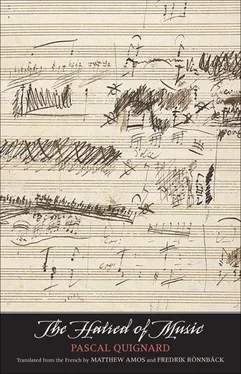Of all the arts, music is the only one to have collaborated in the extermination of Jews organized by the Germans between 1933 and 1945. It was the only form of art to be specifically requested by the administration of the Konzentrationlager . To the detriment of this art form, it has to be emphasized that it was the only one capable of adapting to the organization of the camps, the hunger, the destitution, the work, the pain, the humiliation, and the death.

Simon Laks was born on November 1, 1901, in Warsaw. After completing his studies at the Warsaw conservatory, he moved to Vienna in 1926. He made a living accompanying silent films on the piano. He later moved to Paris. He spoke Polish, Russian, German, French, and English. He was a pianist, a violinist, a composer, a conductor. He was arrested in Paris in 1941. He was interned at Beaune, at Drancy, at Auschwitz, at Kaufe-ring, at Dachau. On May 3, 1945, he was liberated. By May 18, he was in Paris. He wanted to evoke the memory and the suffering of those who had been annihilated in the camps, but he also wanted to reflect on the role music had played in the extermination. René Coudy assisted him. In 1948, he published a book with René Coudy at Mercure de France entitled Musiques d’un autre monde , with a preface by Georges Duhamel. The book was not well received and fell into oblivion.

Since what historians call the Second World War, since the extermination camps of the Third Reich, we have entered a time in which melodic sequences have become exasperating. Over the entire surface of the earth, and for the first time since the invention of the first instruments, the use of music has become at the same time pregnant and repugnant. Suddenly infinitely amplified by the invention of electricity and the multiplication of its technology, it has become incessant, aggressing night and day, in the commercial streets of city centers, in shopping centers, in arcades, in department stores, in bookstores, in lobbies of foreign banks where one goes to withdraw money, even in swimming pools, even at the beach, in private apartments, in restaurants, in taxis, in the metro, in airports.
Even in airplanes during takeoff and landing.

Even in death camps.

The expression Hatred of Music is meant to convey to what point music can become an object of hatred to someone who once adored it beyond measure.

Music attracts human bodies.
Once again it is the Siren from Homer’s tale. Ulysses, tied to the mast of his ship, is assailed by a melody that attracts him. Music is a hook that catches souls and pulls them into death.
This was the pain of the deported whose bodies rose up against their will.

We must tremble when we hear this: those naked bodies entered the chamber to the sound of music.

Simon Laks wrote: “Music precipitated the end.”
Primo Levi wrote: “In the Lager , music led into the depths.”

In the camp at Auschwitz, Simon Laks was a violinist, then a permanent music copyist ( Notenschreiber ), finally a conductor.
The Italian chemist Primo Levi heard the Polish conductor Simon Laks.
Like Simon Laks upon his return, in 1945, Primo Levi wrote Se questo è un uomo . His book was refused by several editors. Finally published in 1947, it was no better received than Musiques d’un autre monde . In Se questo è un uomo , Primo Levi wrote that in Auschwitz, no ordinary prisoner, belonging to an ordinary Kommando , could have survived: “The only ones left were the physicians, the tailors, the cobblers, the musicians, the cooks, the still young and attractive homosexuals, the friends or compatriots of certain camp authorities, plus a number of particularly ruthless, robust, and inhuman individuals, solidly deputized by the SS command as Kapo, Blockältester , or similar functions.”

Pierre Vidal-Naquet wrote: “Menuhin could have survived Auschwitz, not Picasso.”

Simon Laks’s reflections can be divided into two questions:
How could music become “involved in the execution of millions of human beings”?
Why did it play a “more than active part”?
Music violates the human body. It makes one stand up. Musical rhythms enthrall bodily rhythms. When exposed to music, the ear cannot close itself. Music, as a power, thus joins all forms of power. The essence of music is nonegalitarian. Hearing and obedience are related. Conductor, performers, followers, such is the structure put in place by its execution. Wherever there is a conductor and performers, there is music. Plato, in his philosophical writings, never imagined distinguishing between discipline and music, war and music, social hierarchy and music. Even the stars: they are Sirens, according to Plato, acoustic suns producing order and universe. Cadence and measure. Marching is cadenced, truncheon blows are cadenced, salutes are cadenced. The primary function, or at least the most quotidian, assigned to the music of the Lagerkapelle, was to provide a rhythm for the departure and return of the Kommandos.

Hearing and shame are twins. In the Bible, in the myth of Creation, anthropomorphic nudity appears together with the “sound of His footsteps.”
Having eaten the fruit of the tree that reveals nakedness, the first man and the first woman, at the same time, hear the sound of Yahweh-Elohim walking in the garden at the time of the evening breeze and see that they are naked and take refuge behind the leaves of the clothing tree in order to hide their bodies.
Lying in wait of sound and sexual shame make their appearance in Eden together.
Sight and nudity, hearing and shame are the same.
Seeing and hearing are one and the same instant and this instant is immediately the end of Paradise.

The reality of the Lager and the myth of Eden tell similar stories because the first man and the last man are the same. They unearth the ontology of the same world. They expose the same nudity. They lend an ear to the same call that demands obedience. The voice of lightning is the furious night that the storm brings in its thunder.

The sound of one’s own footsteps; such is the first stratum of silence.

What is God? That we were born.
That we were born of others than ourselves. That we were born in an act in which we did not participate. That we were born in the course of an embrace in which two other bodies than our own were naked: that we wish to see.
It happens that, in the movement of the one toward the other, they moan.
Читать дальше













